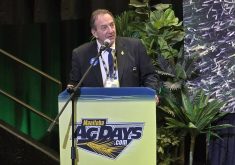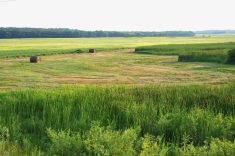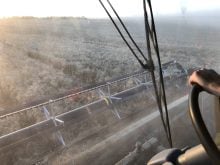After much debate, Keystone Agricultural Producers (KAP) will investigate the possibility of using the Canadian Grain Commission’s $100-million surplus to establish an insurance program for producers.
Members passed a resolution at the organization’s annual general meeting in Winnipeg last week, asking KAP to meet with the commission and examine the possibility of replacing the current bonding system with a new insurance program similar to one which currently exists in Ontario. While frustration was expressed over how the commission’s massive cash reserve was accumulated, members acknowledged the administrative costs of returning money directly to producers would be cost prohibitive.
Read Also

Trade uncertainty, tariffs weigh on Canadian beef sector as market access shifts
Manitoba’s beef cattle producers heard more about the growing uncertainty they face as U.S. tariffs, and shifting trade opportunities, reshape their market.
“It would be very difficult to refund any monies, because the Grain Commission has no records of which producers have contributed towards this surplus,” said one member speaking to the resolution.
Others echoed that sentiment and said that the current bonding system used by the commission is inadequate.
“An insurance program similar to Ontario was always on the table, but never accessible because the startup funds were not there,” said Rob Brunel, who seconded the resolution. “Although I don’t agree with how we achieved this fund, it is there and I think this is the perfect opportunity to finally fix this problem… so I would vote that we work on this and we bring everybody to the table to push this forward.”
Bill Campbell added that non-payment of even one truckload could be catastrophic for a farmer, especially if they have a high debt load.
“Dealing with high-value commodities, when the trucks are larger… you trust the salesman, but you actually have no idea of the financial backing or the financial position of that particular company, and once that truck turns at the end of the lane, your liability goes up tremendously until that cheque is cleared,” he said. “And if I have one truckload that is not paid to me, that could make a difference of whether or not I farm the next year.”
But not everyone believed they should be on the hook if producers make potentially risky sales in pursuit of a high price and others felt the surplus should be used organically by the commission.
“Leave the money where it is and consume it for the purposes it was collected,” said Bill McVicar.
However, Theresa Bergsma of the Manitoba Corn Growers’ Association pointed out that the resolution’s purpose was to initiate a discussion, not pin KAP down to one particular outcome.
“My point bringing this forward, is that we wanted the opportunity for KAP to start working on and discussing this surplus,” she said. “Bonding is pretty cumbersome and costs the system an awful lot of money, it’s just not as visible. I think this type of system, if we model it on the Ontario model, at the end of the day may very well, as it does in Ontario, cost folks very little.”















